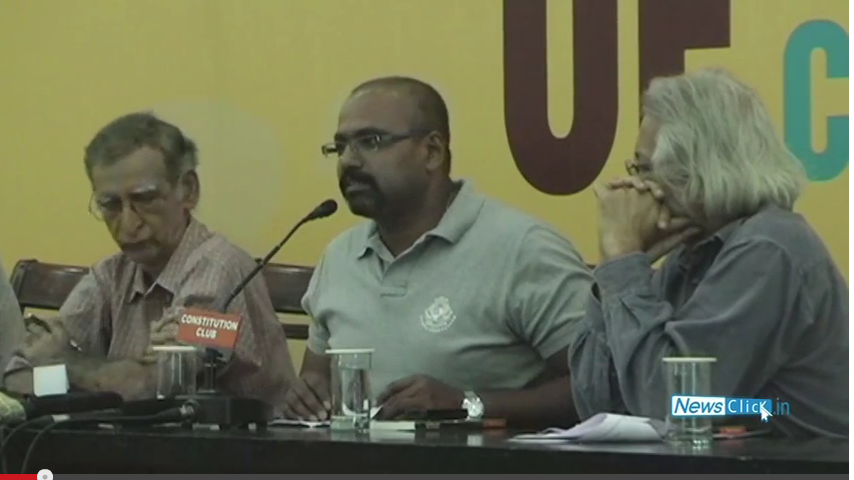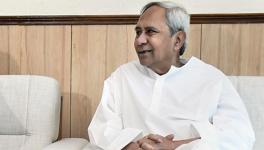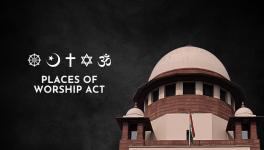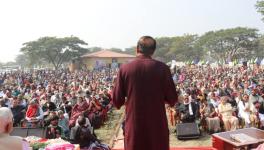Scuttling of Dissent Must Be Opposed
Anil Panikkar speaks on the Right to Dissent at the Idea of India Conclave. He says that unless there is an opposition to the scuttling of dissent, we cannot safeguard it. Freedom to dissent can be there only when there is right to free speech, right to assemble and right to form unions. Panikkar also says that legal measures should be utilised to ensure right to dissent.

What I'm going to speak will be divided in two parts. One is the issue of dissent in itself and secondly I would like to comment on what kind of thinking goes on when people take certain kinds of stands and how these things are coming up? Why has society become like that? Like when Mallika said- Why is this happening? And why don’t people stand up? This is a question which me and my wife, since she's also a practising psychologist, discuss more often and we have a lot of case studies. Whatever I'm going to say is on the basis of those case studies.
First and the most important thing is that I'm sitting here with Anand and my journey into activism has started from one of his films, and by chance one of the students who initiated that thing is also here along with me. We screened ‘Ram Ke Naam’ at the Haryana Agricultural University in Hisar. It went well. The response was good, people were willing to talk and we got a little more enthusiastic, we went on to screen ‘War and Peace’. Again the response was good. The discussion, the size of the discussion, it increased and we were further encouraged so we took the next step of going for documentaries related to livelihood issues and we screened a film called Development Flows from the Barrel of a Gun’ and we were done for it. We got a letter from the Superintendent of Police saying that you need to come and we need to talk. The complaint was given by the RSS chief of that place and he has accused us of sedition (anti-national activities) and we had to submit certain papers to prove that this film was awarded by The Government of India also. So you either first file a case against Government of India, then we are poor souls we're standing up. So somehow we were able to deal with it, but we got a taste of how the state tackles dissent.
We also came to know about how the Right-wing organisations, they use law to browbeat. They're very efficient in using the law in pulling people down and since we were a small group of people voluntarily working and it was very difficult for us to fight it out in that way. Our experiences simply increased after this, one of us, we keep on writing to the Vice Chancellor of one of the new universities formed in Hisar, it's a veterinary university, telling him about the irregularities that are there, telling him please don't do this kind of a thing, it violates your own law. One day we received a legal notice from the university and it was written in the legal notice that this is a goodwill gesture! It’s a good will gesture that we are warning you that you can be charged of defamation. So I never knew that a legal notice can be a goodwill gesture and they said we are warning you of defamation, so I was wondering whatever mail we've sent, whatever letter we've sent that we've addressed only to the Vice Chancellor. We've never released this in public, it never came out in the newspapers, how can it be defamation? I consulted one of my friend’s who happens to be a lawyer there and he said that you be aware of this: one more chap, he did the same thing with the other university at Hissar and he got two years, just because the correspondence was between him and the university. So the issue is that these people, they use law to scuffle, to kill dissent, they don’t want to hear anything that is against what they want to do.
Similarly we had a screening of a documentary on Shaheed Bhagat Singh at Guru Jambheshwar University. The screening went on well, the response as usual was excellent but the next day I got a call from the vice chancellor’s office that you come, that in this particular screening, there were anti-national statements issued and you people declared Shaheed Bhagat Singh as terrorist. So we said that we never declared that so they said no-no it's there, we've received a complaint and then when I went there, he gave me a copy of the complaint, it was submitted by the Bharat Vikas Parishad and a few of the teachers of the university were signatory to that. We had to submit video recordings of that screening to prove our point that nothing like that happened.
So what I'm conveying is that these people are masters in using the law when it comes to pulling down people. The importance of dissent, I mean that's a very important thing which I would like to stress upon, see, unless & until we speak up, unless & until there is an opposition, there is an objection to certain things happening, the chances of improvement are not there and that we have realized. There are small little things when we should have spoken, we should have taken a stand, we don't. So it gets accumulated and the state thinks that it can get away with it. We have seen lots of protests happening, people coming on to the streets, people coming onto the streets is a good thing and it is also a form of dissent, but these kind of protests cannot sustain unless & until there is organisational support. You need organisational support for these protests to actually culminate into something good. And when it comes to organisational support, it is the activists group which works at the lower level, they get together, they form groups and they try to fight it out. But the problem comes in when the government terrorizes these kinds of small groups, we've seen that happening. I mean four hundred of them have been issued notices under the FCRA, so the government tries to control. We formed a group and we were very clear about one thing that no funding from anywhere, we were contributing to it from our own pocket and maintaining it. We were offered funding, that was the strangest thing. I received a phone call from the Health Ministry saying that we would like to fund, primarily because you're involved in some women related issues and mental problems, so we would like to fund and we said we don't need that kind of fund. It's difficult to do, I know, but that is one way of controlling dissent.
See, one thing which I've learnt, I mean the psychological aspect of it is that majority of people, the kind of schooling we have, we are trained to be obedient children, we are trained to be obedient students, we are trained to be obedient sons, we are trained to be obedient daughters and then, the state also expects the same thing. You need to be obedient. My own daughter, she got punished when she was in 3rd standard. A student in class asked how we were born and the teacher started the same old story of the goose and the monkey dropping you here and there and things like that, so she raised her hand and said no-no I know it is not the case, I know how children are born. So the next thing that happened was that she was thrown out of the class, made to stand out and it was ordered that she should not have lunch with other kids because this kid can spoil others.
Someone else: And it was before Harsh Vardhan?
Anil Panikkar: Yes, this was before Harsh Vardhan.
So that happened and I mean again the important thing is that we are moulding the children the way they think, we are moulding them to take obedience, so the more they take obedience, the less the critical thinking part will be there. And the less the critical thinking is, the more they can be controlled by the state. When I see a religious gathering, so many people sitting in front of them, following each and everything that the other person is saying, if he says raise your hand, they'll raise their hand, if he says sway this side, they'll sway that side. Why? In psychological terms we say that many of them, rather majority of them that their adult is dysfunctional, that means the logical reasoning is not there. They are a bundle of emotions, so they can be swayed by emotions and that is what is happening. Most of the so-called technical educational institutes, they've multiplied in numbers and in the technical educational institutions, they are regimented. They're not given time to think, they are regimented. Their timing is such that they don't get time to themselves, they're not allowed to sit with themselves, they are supposed to prepare for their projects or they're supposed to do something or the other. And those things, it may be monotonous, it may be meaningless, but it serves the purpose of the institution that they should never get together and think and have their own ideas.
Our universities, they don't have any problem with the boys who drink, they go out, thrash each other; they don't have any problem with that. But if you form a discussion group, there is a problem. There is a serious problem, because if you discuss, then finally what will you discuss? Slowly, ultimately, those discussions they come to the institution itself. And then they'll challenge why the vice chancellor has passed this order? Why this teacher has been appointed like this? So the institution, it feels challenged, threatened, so they would not like this. So for dissent to happen, it is very important to have free speech. But free speech cannot happen unless and until that free speech has a space to be heard. I mean on Facebook, a lot many people write, we write. But is it reaching to those people who it should reach? What is the media doing? How much space are they actually giving to rational thoughts, progressive ideas? When it comes to economy even, they call them to be thrashed. I've seen many of the anchors doing the same thing; they call people with diverse views not just because they want to give them a space to speak, but primarily because they want somebody to be thrashed.
So, it is very important that for free speech… Unless and until there is free speech, you cannot have a proper dissent, and for dissent to happen, I mean, see, there is one more right which is associated with this right to dissent and that is the right to assemble and the right to unionize. And if you look at the last 10 to 15 years, this is what has happened, I mean, they've started dictating where we should assemble. At a place at Hissar, the main secretariat building is there, the DC has issued an order and they've specifically made a place that is known as Dharna Sthal, so they say go there, sit there and protest. That place is such that nobody can see you, you'll only find some pigs roaming around and may be some people coming out of morning ablutions, no one else. So the administration has decided where we will sit, where we will protest and how we will protest. If you're a good boy, you should follow their orders and if you violate orders, violating orders is a serious thing, that can be sedition, that can be anti-national. So it is very important to have this right to assemble and to raise one's view, one's point, so right to dissent can be utilised once we have these rights.
The right to unionize, I mean, to have associations, we've seen that consistently, even the Rajasthan Government recently passed the order in the name of law reforms, labour reforms, that to form unions now you need 30% people willing to form union, not 10% like earlier. And the number of employees required to form a union, they've increased that also, so it becomes difficult to organize and form unions and then protest. So what is important is that when we're talking about right to dissent, we should also emphasize on having free speech, having the right to assemble at our will, having right to form groups and then there should be coordination between these groups to fight it out. And law, legal measures, we should also use as much as these people use to trouble us. Thank you.
Get the latest reports & analysis with people's perspective on Protests, movements & deep analytical videos, discussions of the current affairs in your Telegram app. Subscribe to NewsClick's Telegram channel & get Real-Time updates on stories, as they get published on our website.
























